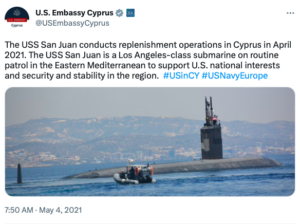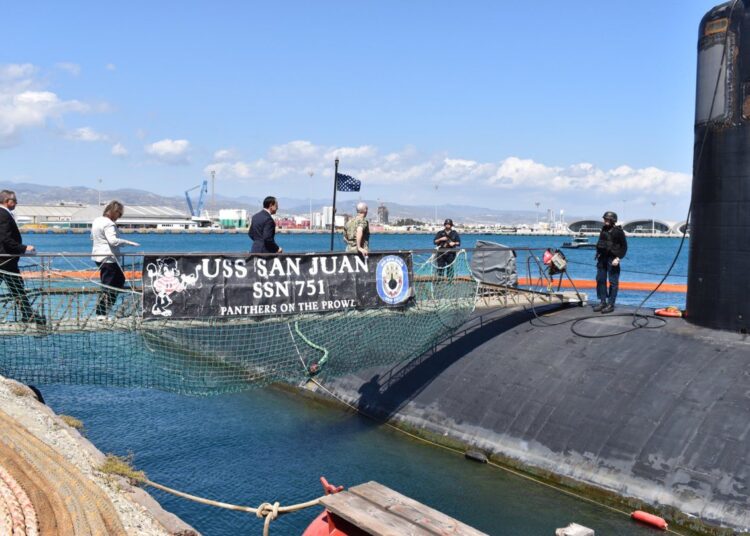Levent Kenez/Stockholm
A rapprochement between Ankara and Athens began after twin earthquakes struck Turkey’s southern region on February 6, as both Turkey and Greece enter election periods, when their respective politicians usually use the enmity between the two countries to woo nationalist voters. Turkey has now abandoned its stance of refraining from making critical statements about Greece and Cyprus since February and protested the visit of a US submarine to Cyprus in a statement in which the US was warned and attention was drawn to the efforts of the Greek Cypriots to more fully arm themselves. However, according to Nordic Monitor research, the same submarine was moored off Cyprus in 2021, after which Turkey failed to raise any objections.
In a press release on Sunday, Ankara strongly supported a statement made by “the Ministry of Foreign Affairs of the Turkish Republic of Northern Cyprus (TRNC) on the anchoring of a US attack submarine at a Greek Cypriot port and the armament activities of the Greek Cypriot Administration.
“As we have repeatedly emphasized together with the TRNC, the steps taken by the US at the expense of disrupting the balance on the Island of Cyprus and encouraging the Greek Cypriot Administration’s armament do not contribute in any way to regional stability or to a just, sustainable and lasting settlement of the Cyprus issue.”

Ankara called on the US to reconsider these policies, adding, “We reiterate that Türkiye will continue to resolutely defend the rights and interests of the TRNC under all circumstances and conditions, within the framework of the responsibility stemming from our guarantor status.”
In an earlier statement the Turkish Cypriot administration, which is not recognized by the international community, said Cyprus continues to disrupt the atmosphere of stability and peace on the island and in the eastern Mediterranean by stepping up its arms purchases.
US Naval Forces Europe-Africa previously tweeted that Capt. John Craddock, commander of Task Force 69, said, “USS San Juan’s port visit to #Limassol demonstrates the U.S. and Cyprus’ unwavering commitment to promoting security and stability in the region,” adding, “San Juan’s forward presence and tactical acuity exemplifies the expertise of the submarine force and our dedication to operating in support of allies and partners.”
The outsized importance attributed by the Greek Cypriots to the submarine’s visit to Limassol may also have prompted Ankara’s harsh reaction. Even Cypriot President Nikos Christodoulides visited the American submarine along with the US ambassador on Thursday.
US Ambassador to Cyprus Julie Fisher hailed the vessel’s arrival as “clear evidence of shared [Cypriot-US] commitment to promoting security and stability in the region.”

An examination of the movements of the USS San Juan show that the submarine has visited Cyprus in the past, briefly anchoring off Limassol for supplies on April 15, 2021 on routine patrol in the eastern Mediterranean. However, Ankara registered no objection at the time.
Cyprus has been divided since 1974, when Turkey invaded in response to an abortive coup engineered by the then-military junta in Athens that aimed to unite the island with Greece. The self-declared Turkish Republic of Northern Cyprus (KKTC or TRNC) is recognized only by Turkey.
It’s no secret that Turkish President Recep Tayyip Erdogan is trying to fan the nationalist climate in the country in advance of the May 14 elections. Following the receipt of aid from abroad and the solidarity displayed after the earthquakes on February 6, Turkey avoided making harsh statements about its traditional opponents Greece and Cyprus. Erdogan also began to spread the idea that America supports his rival, reacting harshly to the March 31 visit of US Ambassador Jeff Flake to main opposition leader and presidential candidate Kemal Kılıçdaroğlu.
Of course, Erdogan is unhappy that Flake’s visit to Kılıçdaroğlu, the chair of the Republican People’s Party (CHP) and the joint presidential candidate of an opposition bloc of six parties known as the Nation Alliance, in advance of the presidential election is interpreted as US support for the opposition and that voters may see this as a message from the West for a post-Erdogan era. According to a widely believed conspiracy theory, a candidate that the West does not want will not win the election.
It would not be a surprise if the Erdogan government’s nationalist reactions to the EU and the United States, increase as the elections draw closer. Erdogan also accuses the opposition of allying with the West claims that if the opposition wins the elections, it will put Turkey at war with Russia.












